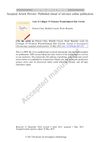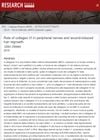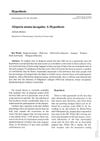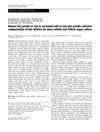 84 citations,
July 2003 in “European journal of biochemistry”
84 citations,
July 2003 in “European journal of biochemistry” Mouse skin can produce and process serotonin, with variations depending on hair cycle, body location, and mouse strain.
 11 citations,
April 2013 in “SpringerPlus”
11 citations,
April 2013 in “SpringerPlus” Human skin's melanocytes respond to light by changing shape, producing pigments and hormones, which may affect sleep patterns.
695 citations,
October 2011 in “Cell stem cell” Low oxygen areas help maintain and protect blood stem cells by using a simple sugar breakdown process for energy and managing their activity levels.
 7 citations,
December 2022 in “Plants”
7 citations,
December 2022 in “Plants” Guava leaf extract may help treat hair loss and protect cells by blocking certain genes and fighting damaging molecules.
 November 2023 in “Frontiers in Neuroendocrinology”
November 2023 in “Frontiers in Neuroendocrinology” Some people experience lasting sexual, psychological, and sleep problems after using finasteride or SSRI antidepressants, possibly due to similar underlying causes.
 32 citations,
May 2015 in “Journal of Investigative Dermatology”
32 citations,
May 2015 in “Journal of Investigative Dermatology” Mice without collagen VI have slower hair growth normally but faster regrowth after injury.
April 2023 in “International journal of molecular sciences” People with Collagen VI-related myopathies may often have hair loss and scalp issues.

Collagen VI is crucial for nerve function and affects wound-induced hair regrowth.
January 2015 in “Elsevier eBooks” CA VI helps maintain pH balance and is important for various bodily functions.
90 citations,
February 2000 in “Dermatologic Surgery” Alexandrite laser hair removal is safe for darker skin tones.
21 citations,
January 2007 in “Journal of Drugs in Dermatology” The laser effectively removes hair for skin types IV and V but is less effective for type VI.
 April 2021 in “Journal of Investigative Dermatology”
April 2021 in “Journal of Investigative Dermatology” Photobiomodulation therapy may help treat hair loss in people with darker skin, but more research is needed.
 9 citations,
May 2005 in “Facial plastic surgery”
9 citations,
May 2005 in “Facial plastic surgery” Laser hair removal can be safe and effective for dark-skinned individuals with the right laser settings.
March 2014 in “Journal of the American Academy of Dermatology” June 2022 in “Pham Ngoc Thach Journal of Medicine and Pharmacy” Tongue fern contains important compounds like polyphenols and flavonoids, best extracted with 80% methanol at 60°C.
 130 citations,
August 2015 in “Experimental Dermatology”
130 citations,
August 2015 in “Experimental Dermatology” Human hair follicle organ culture is a useful model for hair research with potential for studying hair biology and testing treatments.
 78 citations,
August 2002 in “Experimental Dermatology”
78 citations,
August 2002 in “Experimental Dermatology” Researchers developed a quick and easy way to get and grow cells from the base of human hair follicles.
 60 citations,
January 1987 in “Dermatology”
60 citations,
January 1987 in “Dermatology” Alopecia areata may appear differently depending on the individual's type of hair loss and scalp condition.
 27 citations,
November 2005 in “Archives of Dermatological Research”
27 citations,
November 2005 in “Archives of Dermatological Research” Choosing hair follicles at the same growth stage leads to more consistent hair growth experiments.
 22 citations,
August 1999 in “Experimental Dermatology”
22 citations,
August 1999 in “Experimental Dermatology” Certain drugs can cause early hair growth in mice by affecting the nerves.
 20 citations,
October 2008 in “Archives of dermatological research”
20 citations,
October 2008 in “Archives of dermatological research” Angiogenin helps hair grow by stimulating cell growth and blood vessel formation.
 19 citations,
November 2001 in “Journal of Investigative Dermatology Symposium Proceedings”
19 citations,
November 2001 in “Journal of Investigative Dermatology Symposium Proceedings” Human hair follicles can regenerate and recover after severe injury by going through a brief abnormal resting phase before growing again.
 7 citations,
October 2011 in “International Surgery”
7 citations,
October 2011 in “International Surgery” In 2011, hair restoration was a specialized field in plastic surgery, using techniques like "Ultrarefined follicular unit hair transplantation" to minimize scarring and promote hair growth, with future treatments like stem cell therapy and hair cloning still being tested.
 3 citations,
September 1992 in “The Journal of Dermatologic Surgery and Oncology”
3 citations,
September 1992 in “The Journal of Dermatologic Surgery and Oncology” The conclusion is that modifying scalp lifting surgery by cutting one occipital artery and making other changes reduces complications and improves outcomes for patients with severe hair loss.
1 citations,
April 2001 in “Biological Rhythm Research” Deuterium oxide extends the hair cycle duration in mice without changing hair structure.

Melatonin may protect hair follicle stem cells from damage caused by chemotherapy.
 April 2023 in “The journal of investigative dermatology/Journal of investigative dermatology”
April 2023 in “The journal of investigative dermatology/Journal of investigative dermatology” Low-intensity ultrasound may protect hair follicles from damage caused by a common chemotherapy drug.
 April 2023 in “Journal of Investigative Dermatology”
April 2023 in “Journal of Investigative Dermatology” Melatonin may help prevent hair loss caused by the chemotherapy drug paclitaxel.
November 2022 in “Journal of Investigative Dermatology” A new tool helps study hair follicle cells to develop better treatments for hair disorders.
 January 2015 in “Journal of clinical & experimental dermatology research”
January 2015 in “Journal of clinical & experimental dermatology research” A protein combining parathyroid hormone and collagen helped hair regrow in mice with a hair loss condition.





















